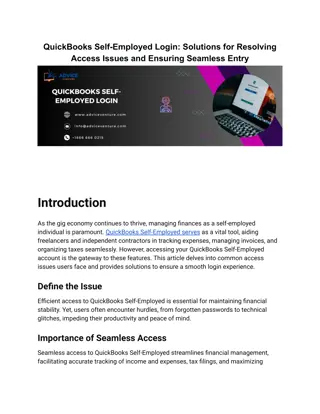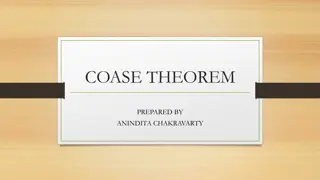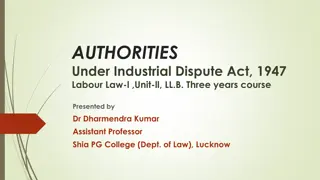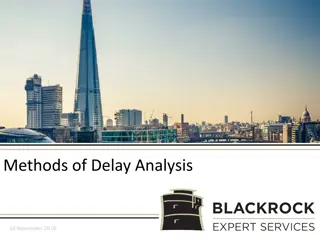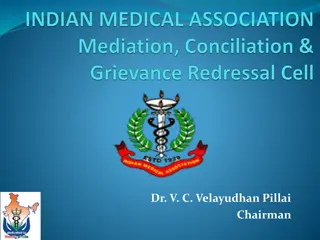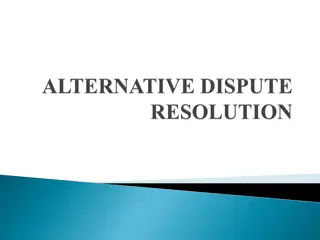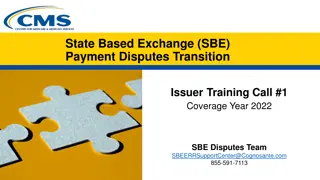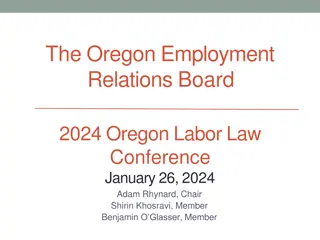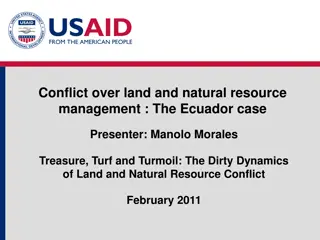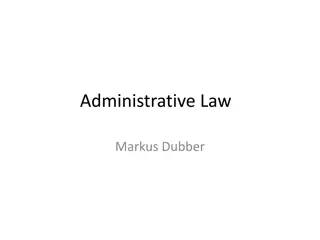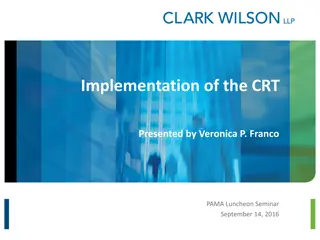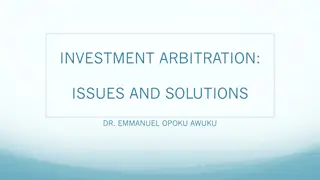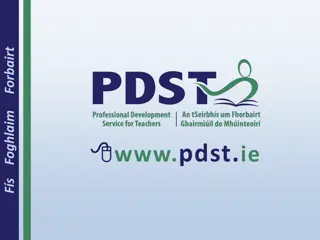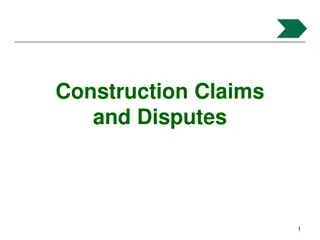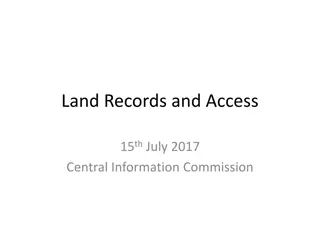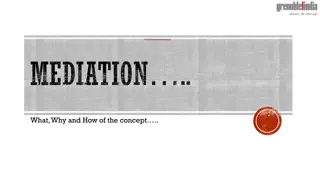Role of Conciliation in Resolving Disputes
Conciliation is a process aimed at bringing disputing parties together to find an amicable settlement with the help of a neutral third party. This article explores the definition of conciliation, the role of a conciliator, essential skills needed, and the importance of conciliation in resolving industrial disputes worldwide.
Download Presentation

Please find below an Image/Link to download the presentation.
The content on the website is provided AS IS for your information and personal use only. It may not be sold, licensed, or shared on other websites without obtaining consent from the author. Download presentation by click this link. If you encounter any issues during the download, it is possible that the publisher has removed the file from their server.
E N D
Presentation Transcript
MEANING The word "Conciliation" is derived from the Latin source conciliatus' meaning to bring together, to make friendly, and to win over. The most accepted definition of "conciliation" is the one by the ILO which describes conciliation as "the practice by which the services of a neutral third party are used in a dispute as a means of helping the disputing parties to reduce the extent of their differences and arrive at an amicable settlement or agreed solution. It is a process of rational and orderly discussion of differences between the parties todisputes under the guidance of a conciliator".
When collective bargaining fails, either party seeks the intervention of the Conciliation Officer and settling disputesoutside the court. In the conciliation process, an independent person intervenes in the dispute as a well-wisher of both the parties. He endeavours to promote a continuing dialogue between the parties in a calm atmosphere so as to secure ultimately an agreement between them. His capacity to review the dispute form an objective basis and present new ideas, to suggest areas of settlement and at times to serve to free the parties from difficult and untenable positions, is an additional advantage to both parties.
Conciliator It need the extensive amount of skill, knowledge, and experience. it require more than 5 years experience These careers usually involve coordination, training, supervising or managing the activities. advanced communication and organization skills are required there is a national license for conciliator.
5 SKILLS NEGOTIATION: bringing other together and trying to reconcile differences. ACTIVE LISTENING: giving full attention and asking question as appropriate and not interrupting at inappropriate time SPEAKING: talking to others to convey information effectively. CRITICAL THINKING: using logic and reasoning to identify the strengths and weaknesses of alternative solution, conclusion or approaches to problem. PERSUASION : persuading others to change their mind and behavior.
English language Psychology law and government Customer and personal service Sociology and Anthropology : knowledge of group behaviour and dynamics, societal trends and influence of human migrations, ethnicity, cultures and their history and origins
ROLE OF CONCILIATION he role of conciliation in the settlement of industrial disputes is now well recognized the world-over. The community has a vested interest in the smooth and uninterrupted supply of goods and services and it is, therefore, prepared to invest in a system which can ensure this. As for the parties more directly involved, namely the employers and the employees, the process of conciliation frequently offers the only alternative to the complete shutdown of the plant, the loss of capital invested and the denial of wages or employment.
Realising the importance of conciliation the International Labour Organisation as early as 1924 in its Section, adopted a resolution instructing its Secretariat "to devote attention to the question of the settlement of industrial disputes and the steps taken in different countries to create a conciliation and arbitration system". The role the Conciliator has to play in bringing together the disputing parties by reconciling their differences and resolving their disputes is not of a routine nature. It is a highly personalised art especially when the conciliation is done in an emotionally sur-charged atmosphere under the shadow of an existing or a developing crisis.
COINCILIATION SETUP The investigation and settlement of industrial disputes through conciliation, arbitration and adjudication. In 1982, by an amendment to the Act, a provision was made under section 9-C for the Settlement Authorities employing 50 or more workmen, for handling certain individual disputesat the plant level. If the decision of these authorities is not acceptable to any of the disputing parties, the dispute can be referred to the industrial relations machinery. Industrial Disputes Act, 1947, provides for the creation industrial of Grievances establishment in
Conciliation officers may be appointed for one or more specified industries, in a specified area, either permanently or for a limited period, to probe thoroughly and mediate in the disputes in order to induce the parties to reach a fair and amicable settlement. Conciliation is compulsory if a strike or lockout is threatened in a dispute in a public utilityservice.
The personalities of the conciliators. They evolve their own procedures and make variations within them according to the situationcreated byeach dispute. 1. Arrangementof Meetings With the completion of the preliminary enquiries, the Conciliation Officer is all set for the conciliation of disputes. The first step in this direction is arrangement of meetings. Meetings with the parties to the dispute are normally of two types, namely, joint-meetings and separate meetings with each of the parties. Under extra-ordinary circumstances, the Conciliation Officer may also go in for private meetings with the minimum number of participants. conciliation procedures are as varied as the
2. RECORD OF PROCEEDINGS It is not necessary that a verbatim record of proceedings should be maintained. Such an attempt would only be a waste of time, energy and stationery. Further, there is the danger of confidential matters being made public. He may, however, take notes of important points. 3. ORDER OF DISCUSSION OF THE ISSUES In case a number of issues have been raised, the Conciliation Officer may consult the parties concerned regarding the order in which the issues are to be taken for discussion. One way is to discuss the issues serially. Another way is to discuss first the more simple issues that may easily yield to settlement. The advantage of such priority based discussion lies in its psychological potentialities. By an agreement on an issue, the parties would be in a favourable mood to discuss the other issues with enthusiasm.
4. ADJOURNMENT The Conciliation Officer need not adopt a hard and fast rule in granting adjournments. The parties should necessarily have time to arrive at a decision on a given issue. But if the Conciliation Officer feels that the adjournment is sought for with a dubious motive, he need not yield to such tactics. 5. SUMMONING POWERS It may be pertinent to mention in this context that the Conciliation Officer may enforce the attendance of any person for the purpose of examination of such a person or call for or inspect any document which may be necessary in connection with the industrial dispute orverify the implementation of any award or carry out any other duty imposed on him under the Act. (Section 11(4)).
6. COMPLETION OF CONCILIATION PROCEEDINGS AND SUBMISSION OF THE REPORT Conclusion by Settlement, or Failure As per Section 20(2) Conciliation proceedings would conclude under the following circumstances: 1. Where a settlement is arrived at and as soon as the memorandum of settlement is signed by the parties to the disputes. 2. Where no settlement is arrived at and as soon as the Failure Report is received by the Government.
CONCLUSION In our country conciliation cannot be said to have made much progress whereas in many other countries, it has worked well. Most of the conciliation work is in the nature of grievance, processing and even there the bulk of the successful disputes centres on minor issues.








